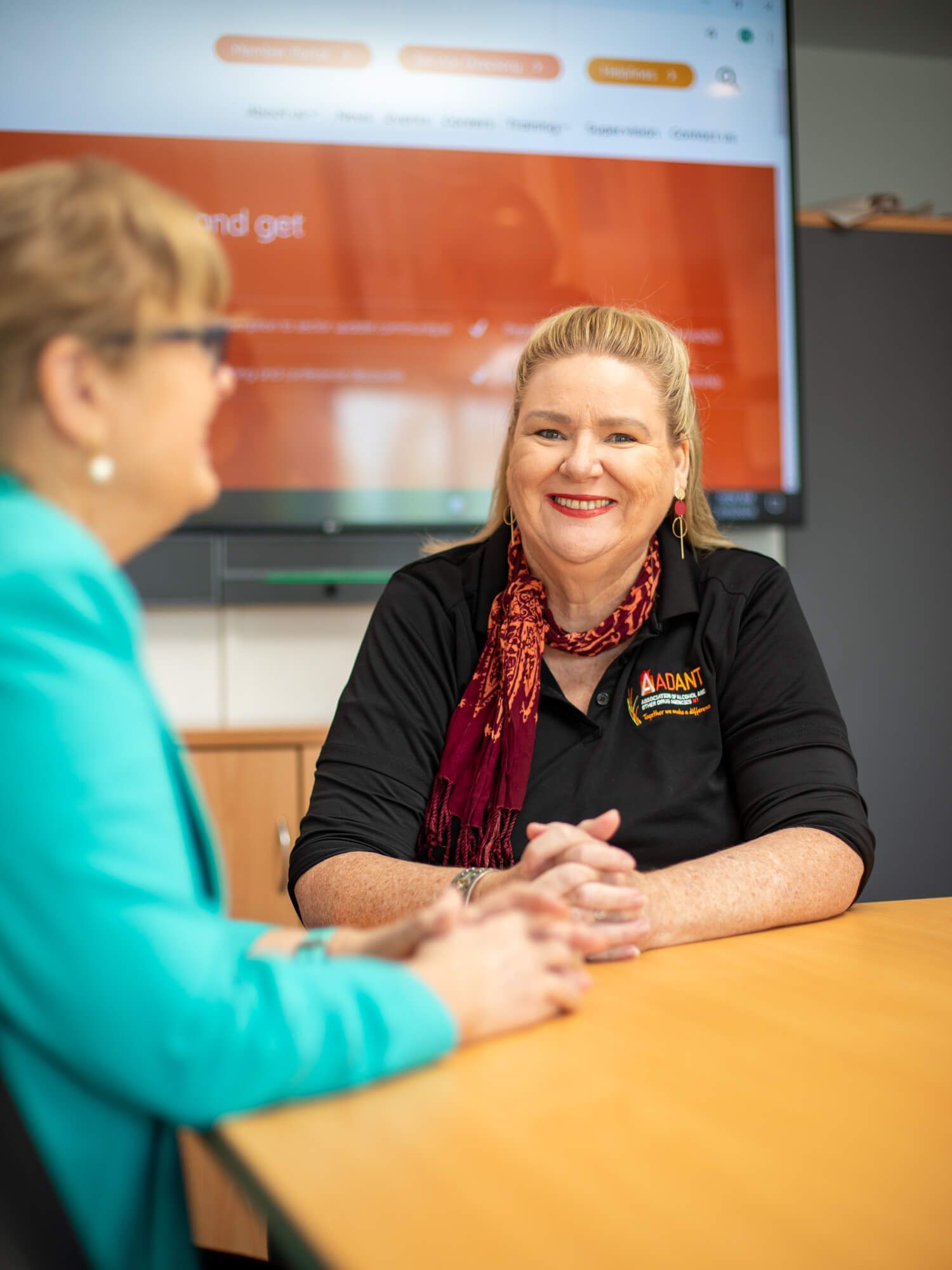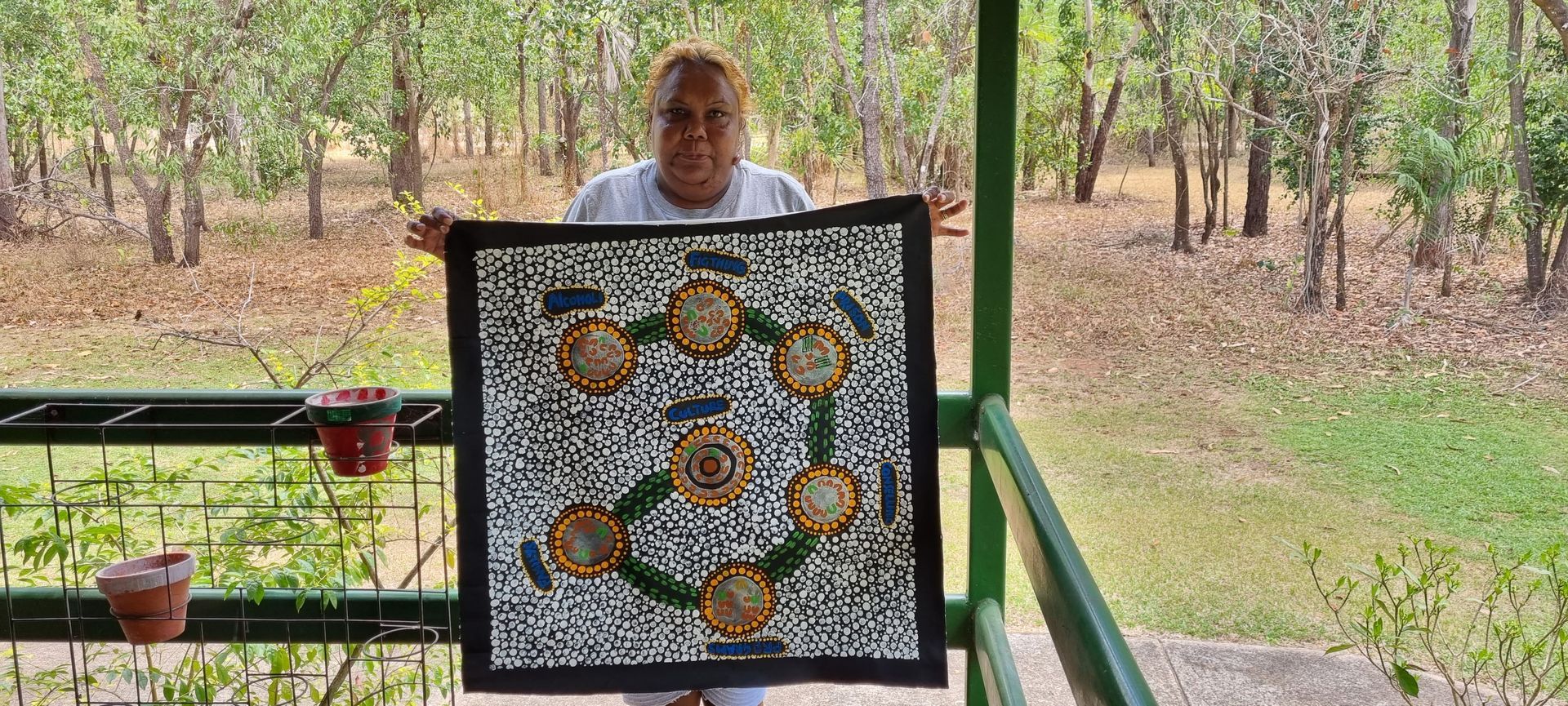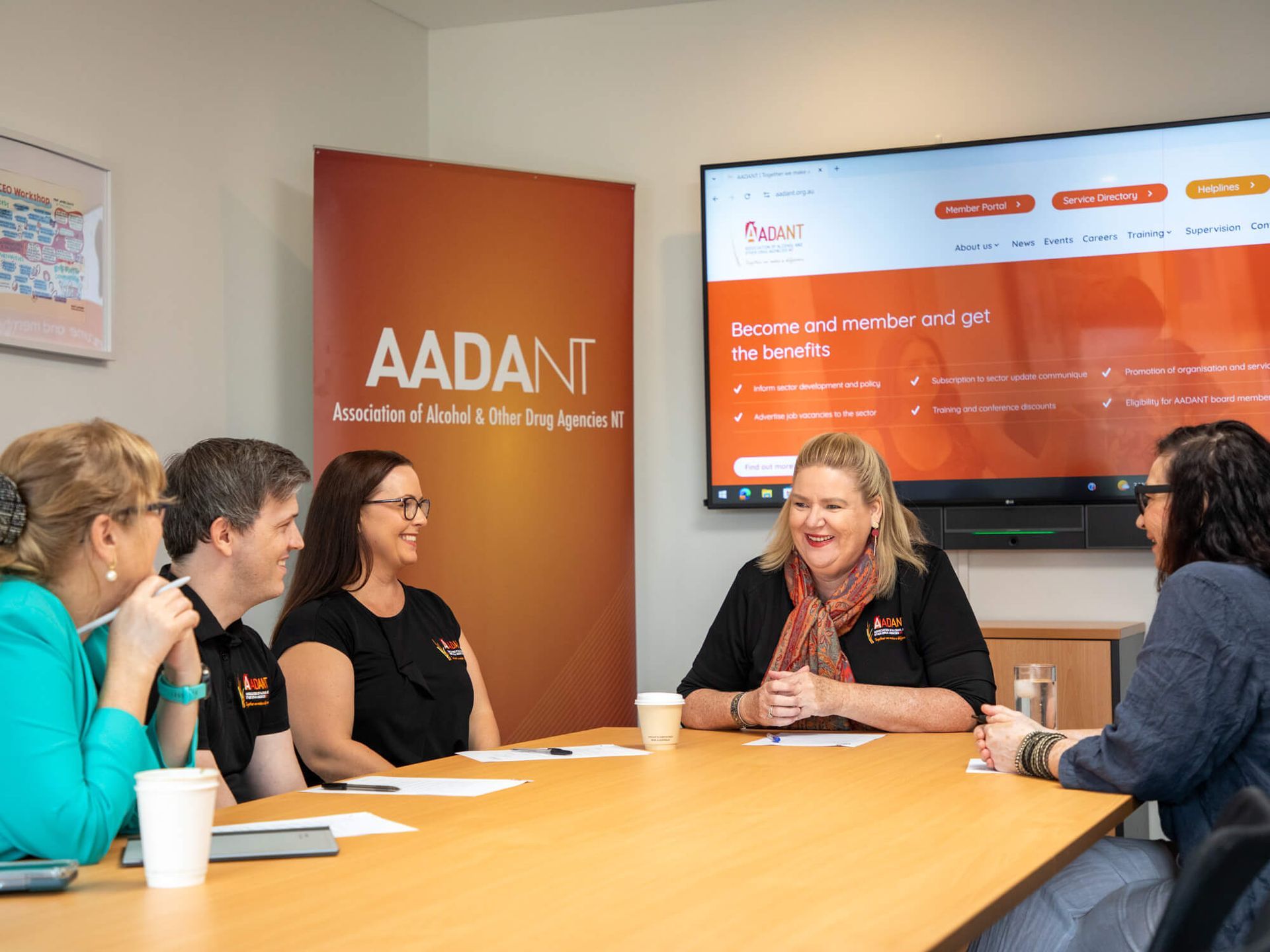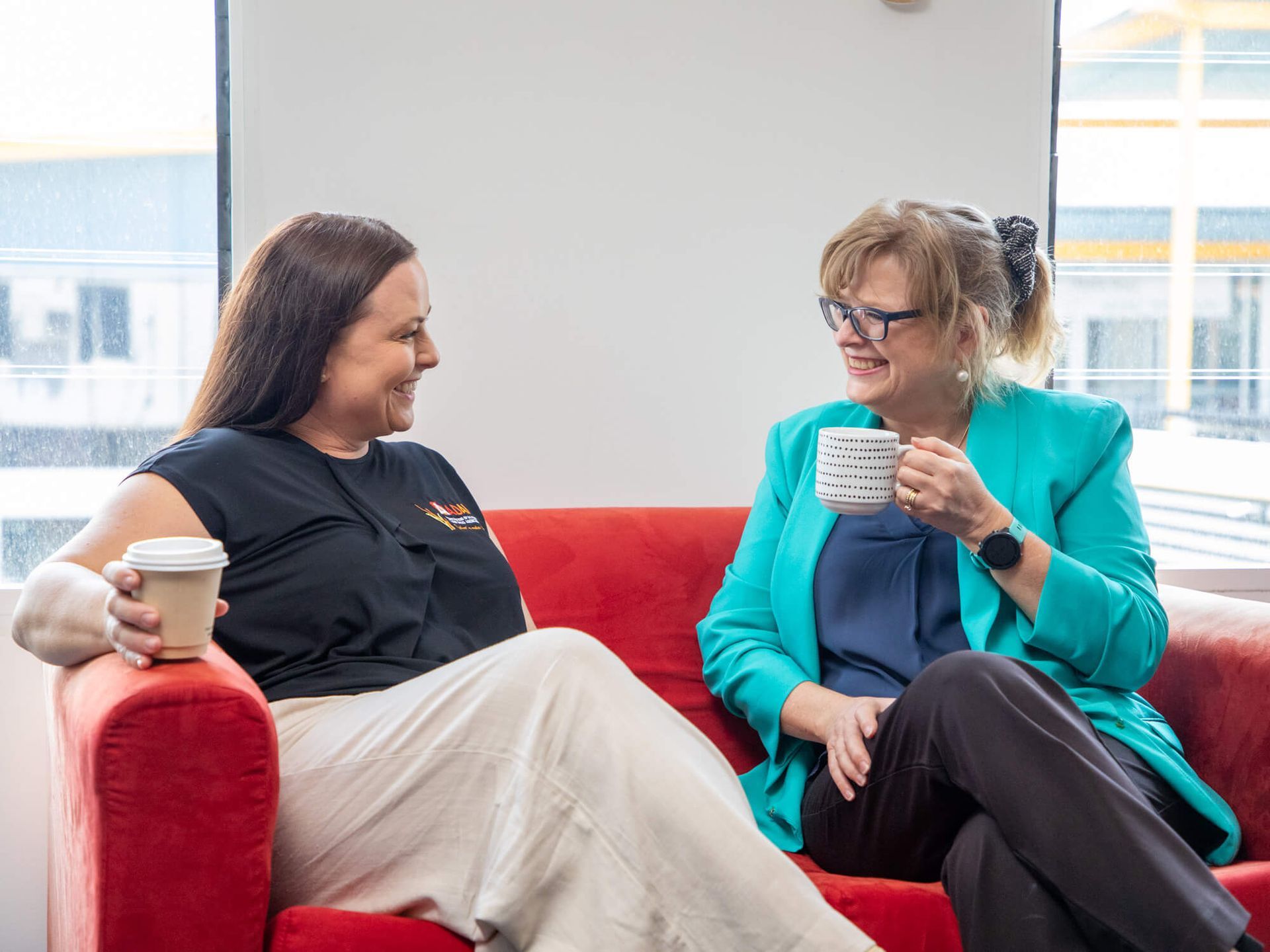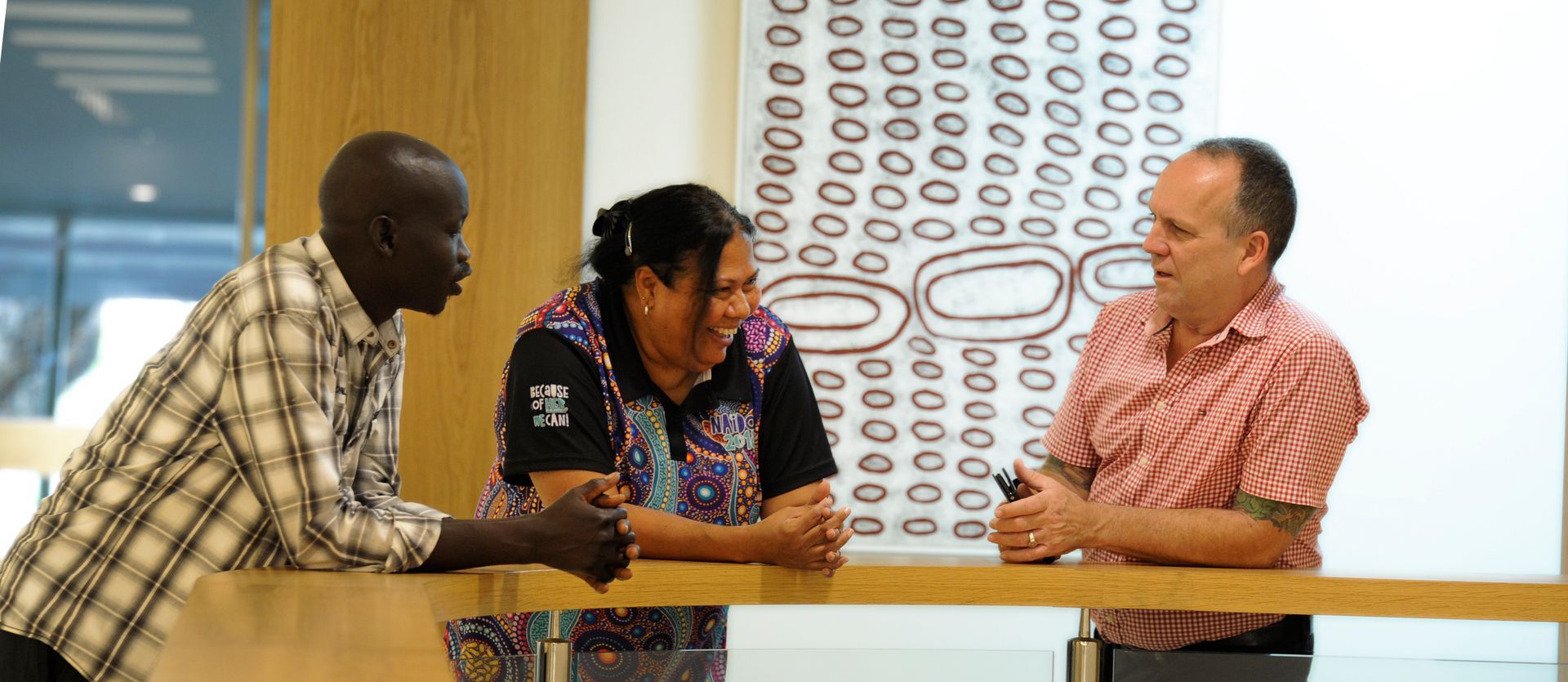News

In an open letter sent to the Hon Lia Finocchiaro, Chief Minster of the Northern Territory (NT) today, more than 200 community leaders and representatives from community, health, Aboriginal and research organisations have called on the NT Government to keep in place measures that work to reduce alcohol-related harm. This includes retaining evidence-based harm minimisation policies, such as the Minimum Unit Price for a standard drink (or floor price) on alcohol and reduced trading hours for take-away liquor outlets. Aboriginal Medical Services Alliance Northern Territory (AMSANT) Chief Executive, Dr John Paterson said, “Grog is something that hurts too many Territorians, and our government should be using every tool in the toolkit to keep people in our community safe and well. “Our message to the Chief Minister is clear: please listen to us and consult with communities who have experienced the damaging effects of alcohol firsthand. “We know all too well what happens when decisions are made without community engagement and consideration of the evidence. We can’t afford to take any backwards steps on alcohol.” Association of Alcohol and Other Drug Agencies Northern Territory (AADANT) Executive Officer Stephanie Holmes said, "We’re calling on the Government to put Territorians’ health first by maintaining alcohol policies that are proven to reduce harm and help make our communities safer. “Measures that prevent unfettered access to alcohol, including the Minimum Unit Price and shorter take-away hours, reduce harm and save lives.” From July 2022 to early 2023, restricted area legislative provisions were allowed to lapse across the NT despite warnings from community leaders of the increased harm that would result. There was, as predicted, a very significant increase¹ in violence and other harm, especially to women. Foundation for Alcohol Research and Education (FARE) CEO Caterina Giorgi said, “Just a few weeks ago following a National Cabinet meeting, every Chief Minister and Premier in Australia acknowledged the role that systems and industries play in exacerbating violence. “They also made a commitment to review their alcohol laws, and their impact on family and domestic violence victims in order to identify and share best practice and reforms. “Removing alcohol harm reduction measures will only increase harm. It will not make women and children in the Northern Territory safer.” Signatories to the open letter include: Dr John Paterson, Chief Executive, Aboriginal Medical Services Alliance Northern Territory Stephanie Holmes, Executive Officer, Association of Alcohol and Other Drug Agencies Northern Territory Dr Donna Ah Chee, Chief Executive Officer, Central Australian Aboriginal Congress Dr John Boffa, People's Alcohol Action Coalition Alice Springs NT Sally Sievers, Chief Executive Officer, Northern Territory Council of Social Service Michael Rotumah, Chief Executive Officer, Larrakia Nation Rob McPhee, Chief Executive Officer, Danila Dilba Health Service A/Professor Robert Parker, President, Australian Medical Association NT Council Darryl Coulstock, Chief Executive Officer, Ampilatwatja Health Centre Aboriginal Corporation Melissa Hinson, Chief Executive Officer, Urapuntja Health Service Caterina Giorgi, Chief Executive Officer, Foundation for Alcohol Research and Education. Open letter: https://fare.org.au/nt-open-letter/ Media contact: Joanna Le | media@fare.org.au | 0402 265 145 Media outlets are requested to promote help-seeking information when reporting on alcohol and other drugs, in line with the Mindframe National Guidelines. Suggested wording relating this this media story: If you or someone you know needs support, please call Lifeline 13 11 14, 13YARN 13 92 76, the National 24/7 Alcohol and Other Drugs Hotline 1800 250 015 or 1800RESPECT 1800 737 732. ¹Alcohol Policy and Alcohol related harm in Alice Springs - Central Australian Aboriginal Congress (caac.org.au)

30 September 2024 Media Release Urgent call to retain minimum unit pricing to protect the community As the new Finocchiaro Government considers major policy reform to protect the community, the Association of Alcohol and other Drug Agencies Northern Territory (AADANT) has called on the government to retain minimum unit pricing as a major evidence-based and cost effective policy to reduce alcohol related crime and harms. AADANT Executive Officer Stephanie Holmes said as alcohol-attributed death rates for Indigenous Territorians are ten times higher than the national average and two times higher for non-Indigenous Territorians, it was critical that the new government invest in effective alcohol policy reforms in the NT. “We welcome the new Finocchiaro Government and look forward to working collaboratively with them as they consider their approach to alcohol-related policy in the NT. “We note that the new government has been elected with a strong mandate to reduce alcohol-related social issues. “We urge the government to focus on alcohol policies with a strong evidence base and track record of making communities safer. “Minimum unit pricing is an example of a policy that has been highly successful in making the community safer, reducing alcohol-related harms and hospital admissions and saving taxpayers money. “Minimum unit pricing has resulted in a 14 per cent decline in alcohol-related assaults in Darwin. "Across the NT, minimum unit pricing has reduced alcohol-related emergency department presentations by 19 per cent.¹ "Minimum unit pricing protects the community from very cheap wine products pushed by the alcohol industry. Cask wine sales in Darwin halved after the minimum unit price was introduced."² Despite claims that minimum unit pricing had driven increases in the consumption of spirits, Ms Holmes said evidence does not support this claim. “There is no publicly available evidence that minimum unit pricing is linked to increased consumption of spirits. “The consumption of spirits was increasing before the introduction of minimum unit pricing, and spirit consumption increased in locations outside the NT where minimum unit pricing has not been introduced at all. “What minimum unit pricing has achieved is the reduction in consumption of low-cost high alcohol content products like cask wine. “And that has resulted in a reduction in alcohol-related assaults and alcohol-related hospital admissions. “We know that minimum unit pricing does not affect moderate drinkers but that the health impacts on heavy drinkers is significant. “Minimum unit pricing costs the government nothing to implement but saves taxpayers millions in reduced policing and health care costs. “Price policies are supported by strong evidence from all around the world. We understand that when alcohol prices drop, alcohol harms increase, and that’s why it's critical that we retain the minimum unit price." Ms Holmes said there was a direct relationship between cheap alcohol and increased alcohol-related harms and strongly cautioned the government against scrapping the policy. “We remain deeply concerned that if minimum unit pricing is scrapped, we’ll see significant increases in alcohol-related harms again. “Having been elected with a mandate to tackle law and order, the scrapping of minimum unit pricing leading to an increase in the availability of cheap cask wine, and the accompanying spike in alcohol-related harms would be contrary to both the government's and the community’s interests. “There is no doubt that scrapping minimum unit pricing in the NT will result in increased assaults, alcohol-related harms, and increased policing and hospital costs. “Instead of scrapping minimum unit pricing, the government should retain the policy and consider introducing indexation, as the legislation initially intended. “This would make an already successful policy even more effective than it currently is and would assist the Finocchiaro Government in delivering on its objectives of making the NT safer." Ms Holmes said she looked forward to working collaboratively with the government on these measures further. “We believe that the Finocchiaro Government and AADANT have the same objectives regarding alcohol policy. “We are both focused on keeping the community safe and reducing alcohol-related harms. “In pursuit of those important objectives, we encourage the government to focus on what works, what's keeping people safe, and what's reducing alcohol-related harms, based on the strong evidence we have on hand. “We strongly encourage the new government to keep minimum unit pricing in place.” Media contact: Darren Rodrigo 0414 783 405 The facts about minimum unit pricing in the Northern Territory Minimum unit pricing, alcohol-related assaults and hospital admissions. • The introduction of minimum unit pricing resulted in a 14 per cent decline in alcohol-related assaults in Darwin. • Across the NT, minimum unit pricing has reduced alcohol-related emergency department presentations by 19 per cent. • While Alice Springs only allows one cask wine to be purchased per person, no restrictions apply on purchasing cask wine in Darwin at all. This means it is likely that cask wine sales and associated harms will spike if minimum unit price is removed. • Based on evidence from other jurisdictions, retaining minimum unit pricing in the Northern Territory will reduce alcohol-related deaths.³ Minimum unit pricing and spirit consumption • There is no evidence that the minimum unit pricing has driven increased spirit use. Spirit consumption increased before the introduction of minimum unit pricing and increased in locations where minimum unit pricing had not been introduced. • International evidence globally demonstrates that the introduction of minimum unit pricing shifts alcohol consumption from high-strength to low-strength products. Scotland saw a shift of 3-8%, the Northern Territory 6-8%, and Wales 9%.⁴ 1 Evaluation of Minimum Unit Price of Alcohol in the Northern Territory – Frontier Economics - 2022 2 Taylor, N., Miller, P., Coomber, K., Livingston, M., Scott, D., Buykx, P., & Chikritzhs, T. (2021). The impact of a minimum unit price on wholesale alcohol supply trends in the Northern Territory, Australia. Australian and New Zealand Journal of Public Health, 45(1), 26-33. 3 https://www.thelancet.com/journals/lancet/article/PIIS0140-6736(23)00497-X/fulltext 4 Menzies School of Health Research study in partnership with Peter Miller and team of Deakin University

The Association of Alcohol and other Drug Agencies NT (AADANT) has submitted a detailed response to the inquiry into Australia's youth justice and incarceration system. AADANT highlights that all Australians, including children and young people, deserve a safe environment and access to quality healthcare. The submission criticises the prevailing "tough on crime" approaches in the Northern Territory, stressing their failure to create safer communities and the disproportionate impact on Aboriginal Territorians. AADANT calls for a shift to evidence-based, public health responses that focus on harm reduction and human rights over punitive measures, advocating for policies that encourage access to support without fear of stigma. While focused on the Northern Territory, AADANT's recommendations have broader implications for youth justice policies across the country. Read our submission

Truth and Justice Commission Bill 2024 The Association of Alcohol and other Drug Agencies Northern Territory (AADANT) thanks the committee for the opportunity to provide a brief response to this Bill. AADANT is the peak body for Alcohol and Other Drugs treatment services in the Northern Territory (NT). As an independent, membership-driven, not-for-profit association, we work with our members to support and strengthen Alcohol and Other Drugs (AOD) service delivery for people who experience harmful substance use in the NT. AADANT supports the establishment of a Truth and Justice Commission, as prescribed in this Bill, to inquire into and make recommendations to Parliament about historic and ongoing injustices against Aboriginal and Torres Strait Islander Peoples in Australia. This is especially relevant to the NT with tenfold the proportion of Aboriginal and Torres Strait Islander residents, compared to the national population, who have suffered historical and continuing impacts of colonialisation and dispossession. These include drug laws, policies and practices that intentionally and disproportionately targeted and criminalised them, such as the NT Intervention. AADANT also acknowledges additional issues and concerns raised by other peak bodies in their responses to this Bill. These include the need for the Commission to: be established within the spirit of the Uluru Statement from the Heart, align with the Closing the Gap Priority Reforms, be representative of Aboriginal and Torres Strait Islander community diversity, and avoid a repeat of the harms caused by the failed Voice referendum process. We specifically endorse submissions to this inquiry by the Queensland Network of Alcohol and other Drugs (QNADA), and the National Aboriginal Community Controlled Health Organisation (NACCHO).

Towards a healthier future: Evidence-based solutions for AOD issues in Australia The ongoing conversation surrounding alcohol and other drug (AOD) issues in Australia highlights a pressing need for a transformative approach—one that moves beyond punitive measures and stigma to embrace an evidence-based public health framework grounded in human rights. AADANT's recent submission to the inquiry into the health impacts of AOD in Australia emphasises the importance of understanding these complex issues as intertwined with social, economic, and psychological factors. This submission outlines the urgent need for comprehensive policy reform and targeted interventions that prioritise accessible, culturally responsive treatment and support services. By shifting the focus from criminalisation to compassion, we can foster an environment where individuals feel safe to seek help without fear of judgment. AADANT advocates for a harm reduction strategy, underscoring the effectiveness of prevention and education in mitigating AOD-related harms. Read our full submission here

Naloxone must be made available to save lives The recent concern about fatal opioid overdose from nitazenes in the illicit drug supply has raised fears for many prison experts. People who are in prison are not afforded the same protections as people in the community while recent release from prison is also an extremely vulnerable time in which many people experience fatal overdose. We, a coalition of health practitioners, harm reduction advocates and experts, are today calling for expanded access to naloxone in prisons to protect against fatal overdoses from nitazenes and other synthetic opioids. In order to prevent avoidable deaths, we are calling on each state and territory government to immediately: Provide training to custodial officers to recognise overdose and administer naloxone Ensure naloxone is accessible to custodial officers to promptly and effectively respond to overdose Ensure that naloxone and naloxone training is routinely offered to all people exiting prison. Nitazenes are a synthetic opioid that can be hundreds of times stronger than heroin and can be fatal even in very small amounts.1 They have been linked to an increasing number of overdoses and deaths in Australia this year2 and have also been connected to at least 15 overdose deaths in prisons in the UK.3 With new national data released last week on wastewater analysis,4 and a NSW Drug Summit now scheduled for later this year, it is a reminder that we should be addressing harms of illicit drug use. “Nitazenes in prisons are a disaster waiting to happen,” says the CEO of the Australian Alcohol and Other Drugs Council, Ms Melanie Walker. “We know nitazenes are in the illicit drug supply in Australia and it is only a matter of time before they enter prisons. People in prison have a higher rate of injecting drug use than the general population and despite efforts to prevent drug supply in prison, the evidence shows that drug use is still common. Nitazenes and other synthetic novel drugs are significantly more difficult to detect than “traditional” opioid drugs such as heroin. Prisons are currently ill equipped to handle a potential influx of these lethal substances,” Ms Walker continued. A key tool in the fight against opioid overdose is naloxone, a life-saving medication which can temporarily reverse an opioid overdose, including from nitazenes. It is available in Australia as an easy-to-use nasal spray or injection. The Australian Government Department of Health and Aged Care recommends that naloxone be administered to anyone overdosing from opioids.5 However, naloxone is not readily available in prisons in Australia. Naloxone is generally only administered by healthcare staff. As noted by Ms Walker, this severely limits access for people who need it, when they need it: “Health staff are not always available or accessible to people in prison. If we are going to save lives, we must find ways to get naloxone to people in prison when they need it. One important step that all prisons could take right now is for custodial officers to have ready access to naloxone and be trained in how to recognise and respond to overdose. Many police officers across Australia now regularly carry and administer naloxone. Custodial officers should be trained in the same way.” The period following release from prison is an especially high-risk time for overdose, with opioid overdose deaths up to twenty times higher for people leaving prison than the general population.6 Ensuring that naloxone and training in how to use it is provided to people in prison before release is a key strategy in combatting overdose deaths.7 However, provision is currently patchy as not every state and territory provides training or access to naloxone for people exiting prison. “There are too few people getting naloxone at the time they leave prison,” says Ele Morrison, Deputy CEO of the Australian Injecting and Illicit Drug Users League (AIVL). “To save lives, training and access to naloxone must be expanded and improved within all prisons. As a first step we call on governments to implement these measures immediately. But we also encourage them to look for ways to implement harm reduction in prison.” -ENDS- Signatories to media statement Mary Harrod, CEO, NSW Users and Aids Association (NUAA) Geoff Davey, CEO, QuIHN Professor Alison Ritter AO, Director, Drug Policy Modelling Program (DPMP), UNSW Liz Barrett, Chair, Harm Reduction in Prisons Working Group Melanie Walker, CEO, Australian Alcohol and Other Drugs Council (AADC) Dr Lise Lafferty, Senior Research Fellow, Centre for Social Research in Health (CSRH), UNSW Sione Crawford, CEO, Harm Reduction Victoria Professor Kate Dolan, Harm Reduction Australia, UNSW John Didlick, Policy Analyst, Hepatitis Australia Paul Dessauer, CEO, Peer Based Harm Reduction WA Brent Bell, CEO, Hepatitis WA Steven Drew, CEO, Hepatitis NSW Ele Morrison, Deputy CEO, Australian Injecting and Illicit Drug Users League (AIVL) 1. Kozell et al, 2024, Pharmacologic characterization of substituted nitazenes at μ, κ, andΔ opioidreceptorssuggestshighpotentialfortoxicity, TheJournalofPharmacologyandExperimentalTherapeutics, https://doi.org/10.1124/jpet.123.002052 2. NSW Health , 29 May 2024 The Age, 4 July 2024: https://www.theage.com.au/national/victoria/synthetic-opioid-detected-in-four-found-dead-in-broadmeadows-20240704-p5jr1k.html 3. Super-strength synthetic opioids causing UK inmate deaths | Matrix Diagnostics 4. ACIC, 11 July 2024, https://www.acic.gov.au/sites/default/files/2024-07/National%20Wastewater%20Drug%20Monitoring%20Program%20%E2%80%93%20Report%2022_0.pdf 5. About opioid overdose and adverse reactions | Australian Government Department of Health and Aged Care 6. https://www.aihw.gov.au/reports/prisoners/the-health-of-people-in-australias-prisons-2022/contents/deaths/deaths-following-release-from-prison ; Borschmann, R. (2024) The Lancet Media Contacts Melanie Walker, CEO, AADC, 0438 430 963 Ele Morrison, Deputy CEO, AIVL, 0433 940 433
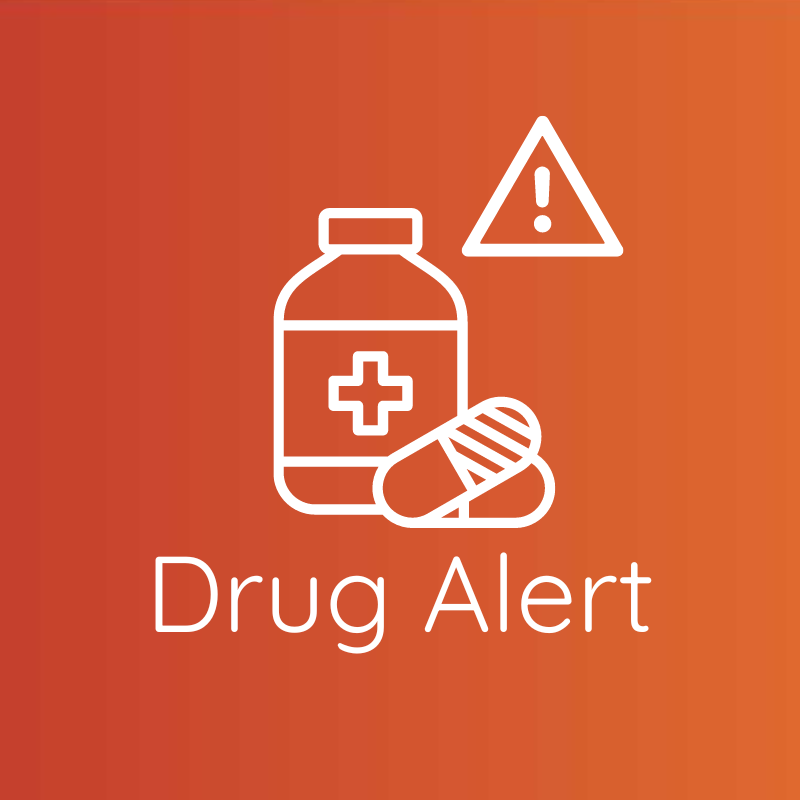
NUAA released a drug alert on Friday, 12 July 2024: Opioid overdoses following stimulant use https://www.instagram.com/p/C9UH_xzteG2/?img_index=1 CanTEST released a drug alert on Monday, 15 July 2024: High dose found in MDMA sample https://www.instagram.com/p/C9bK0TEBxbD/?img_index=1 The alerts will be posted on The Know Community online platform . Please contact PRN admin prn@nccrred.org.au if you require assistance with registration for The Know Community platform.

International Overdose Awareness Day 31 August International Overdose Awareness Day (IOAD) – held on August 31 every year – is the world’s largest annual campaign to end overdose, remember without stigma those who have died and acknowledge the grief of family and friends left behind. Our theme for 2024 is “Together we can”, highlighting the power of our community when we all stand together. #TogetherWeCan #IOAD2024 #EndOverdose No one should stand alone in our fight to end overdose. While every individual action matters greatly, coming together as an international community creates a powerful collective action. One that moves us with greater speed toward our shared goal of preventing, and ultimately, ending all overdoses. Through our 2024 theme, “Together we can” we’re highlighting the strength of coming together and standing in support of those connected to the tragedy of overdose. For people who use drugs and those who don’t. For heartbroken friends and family members of lost loved ones. For activists who fight for sorely needed policy reform. For healthcare and harm reduction workers. For tireless advocates. Overdose can affect anyone, and we encourage you to remember the tenacity of our community. Lean into the power that we can have when we work together. This August 31, reach out and connect with others in your local community and join the global IOAD movement. Our collective voices are stronger, louder, and the most impactful when brought together. Let’s remember, together, we can end overdose. Access campaign resources here.

Inform your clinical practice when working therapeutically with complex trauma Blue Knot Foundation offers a range of clinical guidelines and training programs to help support practitioners in their therapeutic work. All our training programs are grounded in lived experience, the latest research and practice evidence which is articulated in our publications. Practice Guidelines for Clinical Treatment of Complex Trauma: These 2019 updated Clinical Practice Guidelines present evolving research and clinical insights around complex trauma. Complementary Guidelines to Practice Guidelines for Clinical Treatment of Complex Trauma: These Complementary Guidelines complement and support the Practice Guidelines for Clinical Treatment of Complex Trauma (2019) by specifying what working with complex trauma clients requires and the relevant competencies needed by practitioners to do the work. Practice Guidelines for Identifying and Treating Complex Trauma-related Dissociation: These guidelines are for clinicians who work in a range of roles, come from different disciplines, and have received diverse training but who want to enhance their ability to recognise and work with people experiencing complex trauma-related dissociation. Guidelines for Clinical Supervisors of Therapists who Work with Complex Trauma and Dissociation: These clinical supervision guidelines support clinical supervisors of therapists working with complex trauma and dissociative clients to enhance their professional and ethical practice.

Australian governments spend more on law enforcement in illicit drug policy than treatment, prevention and harm reduction combined, says a UNSW Sydney report. Read the report here. The findings published today reveal that state and federal governments spent approximately $5.45 billion in the 2021/2022 financial year on illicit drug countermeasures. Nearly 65 per cent ($3.5 billion) was spent on law enforcement programs, including $1.8 billion on routine policing against drugs. Less than 2 per cent ($90 million) was spent on harm reduction measures such as needle syringe programs and supervised injecting facilities. “Governments do invest a significant amount of money on proactive drug policy, and where they spend that money shows what they consider as important in responding to drugs,” says Professor Alison Ritter AO, the report’s lead author and drug policy specialist at the Social Policy Research Centre, UNSW Arts, Design & Architecture. “This research provides the foundation for evaluating the investment and whether Australia is on the right path to reducing drug-related harm.” Files from UNSW Sydney Newsroom

Challenges and opportunities for law enforcement On 26 September 2022, the Joint Committee on Law Enforcement resolved to inquire into and report on the challenges and opportunities for law enforcement in addressing Australia’s illicit drug problem. Closing date for submissions was Friday, 13 January 2023. A report has now been released with recommendations strongly aligned with the National AOD Peak's submission, (Australian Alcohol and other Drugs Council ((AADC).) Read the report and recommendations here .

YOUTH SURVEY: Mission Australia 23rd annual Youth Survey Mission Australia is calling for young people aged 15-19 to have their say. It is the largest online survey of its kind in Australia and provides an important annual snapshot into the experiences and views of young people aged 15-19. Last year, nearly 20,000 young people completed the survey, naming the environment (44%), equity and discrimination (31%), the economy and financial matters (31%) and mental health (30%) as the issues they believe are most important in Australia. Have your say here #youthsurvey2024

Update supplied by NTCOSS Congratulations to NTCOSS’s chair and CatholicCare NT executive director Jayne Lloyd who was last week awarded the Medal of the Order of Australia in the General Division. Jayne is pictured below with her family at the investiture at Government House hosted by NT Administrator Dr Hugh Heggie. Jayne was awarded for her service to the community through social welfare organisations including more than two decades at CatholicCare.

This Sunday 26 May is National Sorry Day, which marks the anniversary of the tabling of the Bringing Them Home report in the Australian Parliament in 1997. The day is an opportunity to remember the grief, suffering and injustice experienced by the stolen generations, acknowledge the strength of Survivors, and reflect on how we can all play a part in the healing process for our people and nation. Sorry Day is followed by National Reconciliation Week (27 May to 3 June). The theme for this year is Now More Than Ever, a reminder that we all need to tackle the unfinished business of reconciliation. You can learn more about the history of National Reconciliation Week here .
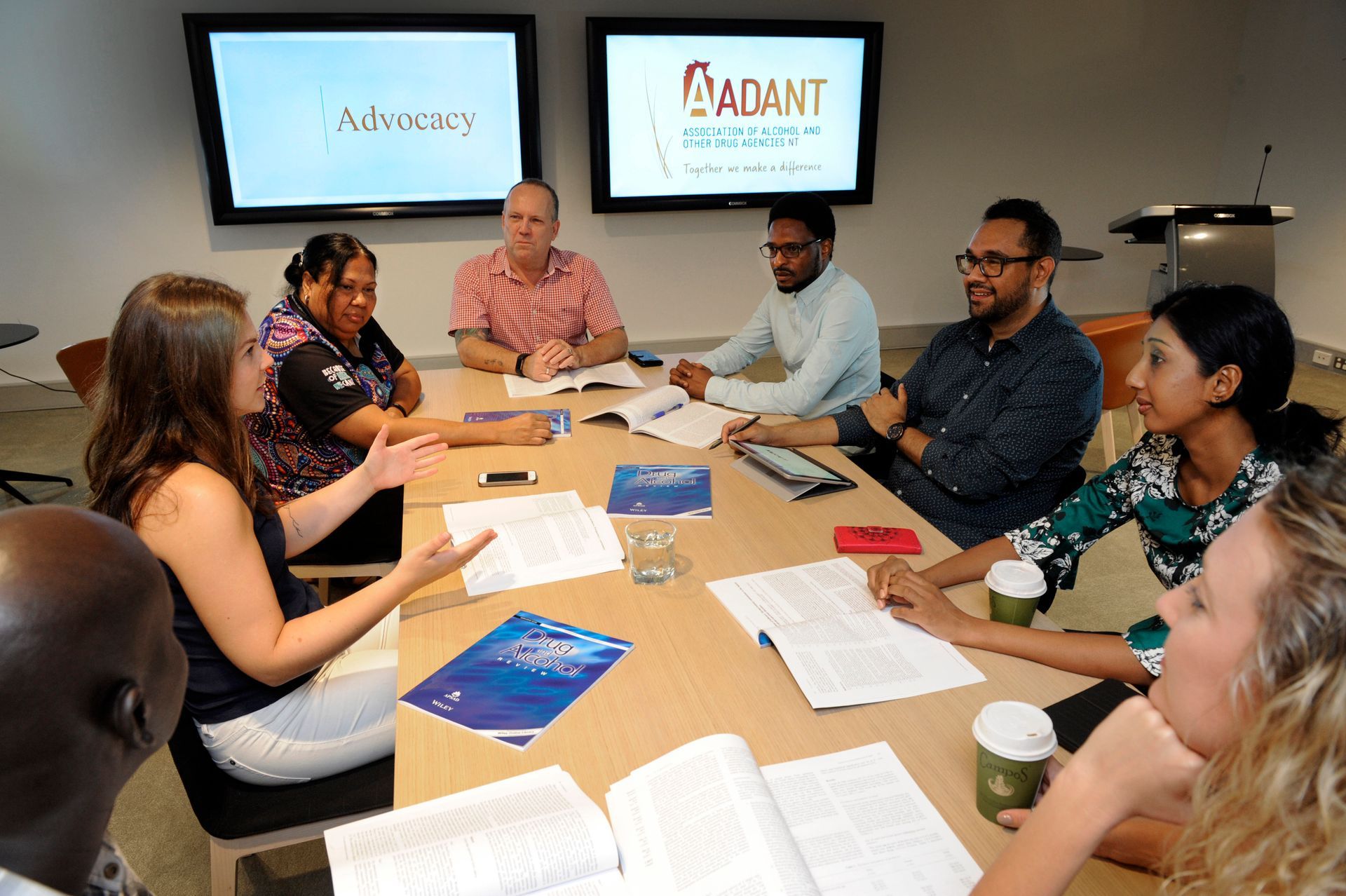
Exploring patterns by remoteness and socioeconomic factors The National Wastewater Drug Monitoring Program provides analysis of wastewater samples collected from areas that cover over 50% of the Australian population. It includes samples from most degrees of remoteness and socioeconomic status ranges. This study used wastewater data from 2016 to 2023 to assess for differences and trends in alcohol consumption by degree of remoteness and socioeconomic indicators across Australia. Steeper declines in Australian alcohol consumption were found in large urban areas than regional and remote locations. There were smaller annual decreases in the most socioeconomically disadvantaged areas. The authors suggest that if continued, these trends may increase Australian health inequalities and that policy and prevention work should be appropriately targeted to produce more equitable long-term outcomes. Read the full paper here.

Insight have just published a new module as part of their broader withdrawal management eLearning course focussing on psychostimulants. The aim of this module is to equip workers with a greater knowledge and awareness of psychostimulants as well as practical strategies and techniques for managing psychostimulant withdrawal. More specifically, the module covers: the neurobiology and symptomology of psychostimulant withdrawal treatment options for managing psychostimulant withdrawal. Click here to access the module.

The Northern Territory Government is changing how long service leave works for people who work in the community services sector. Right now, if you work for the same employer for 10 years, you get 13 weeks of paid time off as long service leave. But the government wants to make it fairer. Here's what's changing: If you've been continually working in the community services sector for at least 10 years but have had more than one employer, you can get long service leave. Your total years of working in the community services sector will count, not just the time with one employer. This means you can get long service leave even if you change jobs within the sector. This change is called making long service leave ‘portable’. Why is this happening? It recognises that people work hard in the community services sector and should get the entitlements they deserve, even if they change jobs. Many people who work in community services change jobs within their first 9 years, but most of them stay in the community services sector. This new scheme will help community service workers get the same entitlements as other workers in the Northern Territory. It's important because these workers provide valuable services and support to our community and deserve to take meaningful, well-earned breaks from work. Have your say A second phase of consultation is now underway, ahead of the Bill being debated in the Northern Territory Legislative Assembly in May 2024. Visit the webpage to find out more information and share your feedback. https://nt.gov.au/portable-long-service-leave

Insight recently launched a new e-learning course titled "Family inclusive AOD practice." This course offers an introduction to family inclusive practice and provides tools that workers can utilise to enhance their practice in this area. The involvement of families in AOD practice contributes to improved outcomes for both individuals seeking treatment and their families. The course is designed for all AOD, mental health, and social and emotional wellbeing workers. It consists of two modules, accessible through the following links: Family Inclusive AOD Practice - An Introduction Family Inclusive AOD Practice - Practice Tools

.... AADANT is pleased to share Jocelyn Dhu of DASA (member of AADANT) is a finalist in the Women of the Year Awards in the First Nations Person category recognising significant achievement made by First Nations women across all sectors of the community. Born and raised in Alice Springs, Jocelyn is the deputy chief executive officer at Drug and Alcohol Services Australia. The mother of three and proud Arrernte and Banyjima woman has worked at DASA for more than 10 years and was previously in roles with Territory Families and Community Corrections. Outside of her work, Jocelyn volunteers on the boards of both the YMCA NT and the Women’s Safety Services of Central Australia and has delivered the Drink and Drug Driver Course in Alice Springs and other remote NT communities for many years. For 10 years she has also supported the work of the Suicide Story project. To vote for Jocelyn, please click here.

Are you ready to be a part of something truly special at BASSINTHEGRASS this year? We're reaching out to you with an exciting opportunity to join the All Good Project and make a real difference in our community. The All Good Project is dedicated to creating a safe, inclusive, and enjoyable environment for all festival-goers. This year, we're once again running a care space, peer education programs, and roving teams to ensure that everyone can party responsibly and safely. We believe that festivals should be a place where everyone feels welcome and supported, and that's where you come in. By volunteering with us, you'll be helping to spread good vibes and make a positive impact on the BASSINTHEGRASS experience for everyone. Here's how you can get involved: Care Space Volunteers: Provide support and assistance to anyone who needs it in our care space. This could involve offering water, providing a listening ear, or helping someone find their friends. Peer Educators: Help educate fellow festival-goers about harm reduction, consent, and staying safe. Your knowledge and guidance could make a world of difference to someone in need. Roving Teams: Patrol the festival grounds and keep an eye out for anyone who may need assistance. Your presence alone can help deter potential issues and ensure that everyone feels secure. No matter which role you choose, you'll be an essential part of our mission to create a welcoming and safe environment for all. Plus, you'll have the opportunity to connect with like-minded individuals, gain valuable experience, and have a lot of fun along the way. If you're interested in volunteering with the All Good Project at BASSINTHEGRASS, simply follow this link to sign up. Together, we can make a difference and ensure that everyone has a fantastic time at this year's festival.

2 April 2024 A new study led by Menzies School of Health Research has uncovered strong support from Northern Territory (NT) festival goers, for drug checking (also known as pill testing) to reduce harm. Published last week in Drugs: Education, Prevention and Policy, the study analysed responses from 539 participants, as part of a survey that is conducted annually at a NT music festival. When measuring attitudes and intended behaviours towards drug checking, it found that the majority of people surveyed supported the option for people to test their drugs prior to events. The majority of survey participants also said they would feel safer if a testing service was available. As a result, this multi-institute, collaborative study provides valuable insights into local needs and attitudes of the NT population. The study recommended further exploration of the potential role of a drug checking services in the Northern Territory as a safe, evidence based, publicly-supported mechanism to protect against drug-related harms. Previous research has shown that reducing harms from drugs requires a holistic approach. This means measures that keep people safer while using, in addition to strategies that regulate the market as well as treatment and education. Evidence also suggests that offering these services does not lead to increased drug use or increased intention to use, but rather helps to lessen the potential of adverse consequences. Drug checking is an evidence-based harm reduction intervention, implemented safely in more than 20 countries worldwide. It has been demonstrated to reduce avoidable harms including deaths. In Australia, it is increasingly recognised as a valuable tool for reducing harms, following two successful trials at an ACT festival and the trial of a fixed site service in Canberra. In addition to this, mobile and fixed site pill testing services have been recently announced in Queensland. The findings of the study, titled: Safe beats down under: investigating the support of drug checking at a regional festival in the Northern Territory, Australia, can be read in full online: https://www.tandfonline.com/doi/full/10.1080/09687637.2024.2330938 Quotes attributable to senior author of the study, researcher from Menzies School of Health Research, Dr Cassandra Wright: “Our study suggests that there is enough demand and appetite to look at pill testing as a viable and empirically backed way to protect people from harms. “It’s not enough to tell people to not use drugs. We know from decades of research that if we want to reduce harms, we need measures that keep people safe while using.” Quotes attributable to co-lead of the study, researcher from Griffith University, Dr Timothy Piatkowski: Our research, the first of its kind at a music festival in the NT, reveals widespread support across age groups with preferences for onsite pill testing at festivals and events. “It reminds us of the vital role of harm reduction efforts to support people in making well informed choices.” Quotes attributable to study partner, MusicNT Executive Director, Mark Smith: “Protecting people from harm and ensuring everyone can enjoy live music are key goals for MusicNT through the All Good Project. “Undertaking on-the-ground research at one of NT’s live music festivals demonstrates that the attitudes of NT concert goers’ echoes that of audiences across the nation. We applaud Menzies for this vital piece of work and encourage governments to engage in forthright conversations around implementing pill testing to protect future festival audiences.” ENDS Media contact: Phone: (08) 8946 8680 | Email: media@menzies.edu.au Menzies School of Health Research Menzies is one of Australia’s leading medical research institutes dedicated to improving the health and wellbeing of Aboriginal and Torres Strait Islanders, and a leader in global and tropical research into life-threatening illnesses. Menzies continues to translate research into effective partnerships and programs in communities across Australia and the Asia-Pacific region. Fast Facts Drug checking / pill testing: Illicit drug use is common in Australia. This study uncovered, 2 out of 5 people reported use of illicit drugs in the past month. The use of illicit drugs is prohibited, which means the supply of drugs is unregulated and can be unsafe Unsafe supply of drugs can be due to excessive purity in batches, adulteration/additives (e.g. adding fentanyl to methamphetamines) and mislabeling/one drug being sold as another (e.g. ketamine sold as cocaine), or the emergence of novel psychoactive substances in the illicit drug market for which there is little data. Harm reduction measures like drug checking provide people with information so that they can make an informed decision on whether to use or not. Other harm reduction measures like access to non-judgmental, evidence-based drug information and safer using strategies, and the national Prompt Response Network drug surveillance system provide information to educate users and alert them to drugs that are causing harms.

Please see publication from the AIHW on summary of key points in AIHW's 'Alcohol and other drug treatment services in Australia: early insights'. You can find more information here. Summary of Key Points In 2022-23 Around 131,500 people received publicly funded treatment or support for alcohol and other drug (AOD) use. A total of 235,461 treatment episodes were provided to people for their own or someone else’s AOD use. For people who received treatment for their own AOD use: Over 2 in 5 (43%) treatment episodes were for alcohol, followed by amphetamines (24%), cannabis (17%) and heroin (4.5%). For clients, there was variation across age groups for the most common principal drugs of concern: Alcohol was the most common principal drug of concern for older clients (48% of those aged 40–49; 63% of those aged 50–59; and 77% of people aged 60 and over). Amphetamines were the most common principal drug of concern for clients aged in their 20s and 30s accounting for 1 in 3 clients aged 30–39 (32%) and 1 in 4 aged 20–29 (25%). Cannabis was the most common principal drug of concern for younger clients, with almost 2 in 3 (64%) clients aged 10–19 receiving treatment for cannabis. Counselling continues to be the most common treatment provided. 2 in 3 treatment episodes were provided in a non-residential treatment setting.

Drug use affects individuals, families and the community. Every 3 years, people in Australia are asked about their use and opinions of licit and illicit drugs, including alcohol, tobacco, cannabis, e-cigarettes and vapes. More than 21,000 people across the country took part in the latest National Drug Strategy Household Survey, held in 2022 and 2023. This report presents findings from the survey and looks at what has changed over the past 20 years. Some quick key headlines: Cannabis remains the most widely used illicit drug, with 2.5M Australians using it recently. Overall recent illicit drug use has increased from 3.4M (2019) to 3.9M, primarily driven by increases in hallucinogen use (now the 3rd most commonly used illicit drug type). Daily tobacco smoking rates have decreased from 11% (2019) to 8.3%, particularly for people under 60 years, however e-cigarette use has increased by 4.5% (2.5% to 7%) with people aged 18-24 years having the biggest jump in current e-cigarette use (5.3% to 21% now). Recent use of methamphetamines/amphetamines is low (1% or 200,000 people) There has been a slight decline in the rates of people consuming alcohol in a way that put their health at risk (32% in 2019 and 31% now) Women aged 18-24 years are more likely to consumed alcohol and other drugs now than in 2019 and recent use of any illicit drug is at equal rates between young men and women (35%). Support for stricter policies designed to reduce excessive alcohol consumption declined, while support for policies targeting problems associated with e-cigarettes increased Support for drug checking (64% support) and drug consumption rooms (53% support) increased Support for law enforcement responses to illicit drug use continued to decline while support for treatment and education continued to increase. Access the findings here.

The Matilda Centre for Research in Mental Health and Substance Use at the University of Sydney is excited to let AADANT members know that the Australian Government Department of Health and Aged Care have funded the development of an online Community of Practice for practitioners working in the Australian alcohol and other drugs (AOD) sector. Our objective is to establish a dynamic platform where professionals from multiple disciplines across health and social services can exchange knowledge, resources, and ideas regarding the management of co-occurring AOD and mental health conditions. We are currently seeking expressions of interest from professionals from multiple disciplines across health and social services (such as, AOD workers, general practitioners, addiction medicine specialists, psychologists, psychiatrists, counsellors, social workers, peer workers, pharmacists, residential support workers, nurses, other allied health professionals and people with lived or living experience of AOD use, or caring for someone experiencing problems related to their AOD use) to provide input on the development of this. Online Community of Practice via focus groups. Your valuable insights will play a pivotal role in shaping the development and refinement of this resource to ensure that it best meets practitioners needs. If you are interested, please complete the survey provided below and the project team will be in touch. Expression of interest: https://sydney.au1.qualtrics.com/jfe/form/SV_3yHtAIoWsBxXdY2 For more information: Email Kathleen Palmer (Research Assistant, Matilda Centre) on Kathleen.palmer@sydney.edu.au .

Drug overdose is a national catastrophe. More Australians now die from overdose every year than on our roads, yet this crisis remains poorly understood by the wider public. Our definitive annual review of overdose, Australia’s Annual Overdose Report 2023 (AAOR 2023), challenges this lack of urgency. This landmark report, produced since 2016, grew further in influence this year, generating extensive media attention and public conversation. It provides vital evidence of the scale of the overdose crisis and its growing impact on our community. Thank you to all members of the expert advisory committee for their valued support throughout the development of this report. Our AAOR 2023 documented a number of crucial issues: Overdose is a crisis that requires urgent attention; Opioids and benzodiazepines play a major role in overdose in Australia; Aboriginal and Torres Strait Islander communities are disproportionately affected by overdose; Prescription drugs help fuel overdose rates; Overdose affects Australian adults of all age groups. Read the report here.

Do you have lived or living experience of an alcohol use disorder, and do you know about, or have you used, zero-alcohol drinks? (beverages like beer or spirits that have 0.5% alcohol or less in them) Contribute to important research about the potential impacts of zero-alcohol drinks on people with lived or living experience of an alcohol use disorder in a 45-60minute face-to-face or Zoom research interview. You may be eligible if you are over the age of 18 and identify as someone having lived or living experience of an alcohol use disorder. Please access the study here to participate . For more information, please contact: Mia Miller, Project Manager mia.miller@menzies.edu.au
